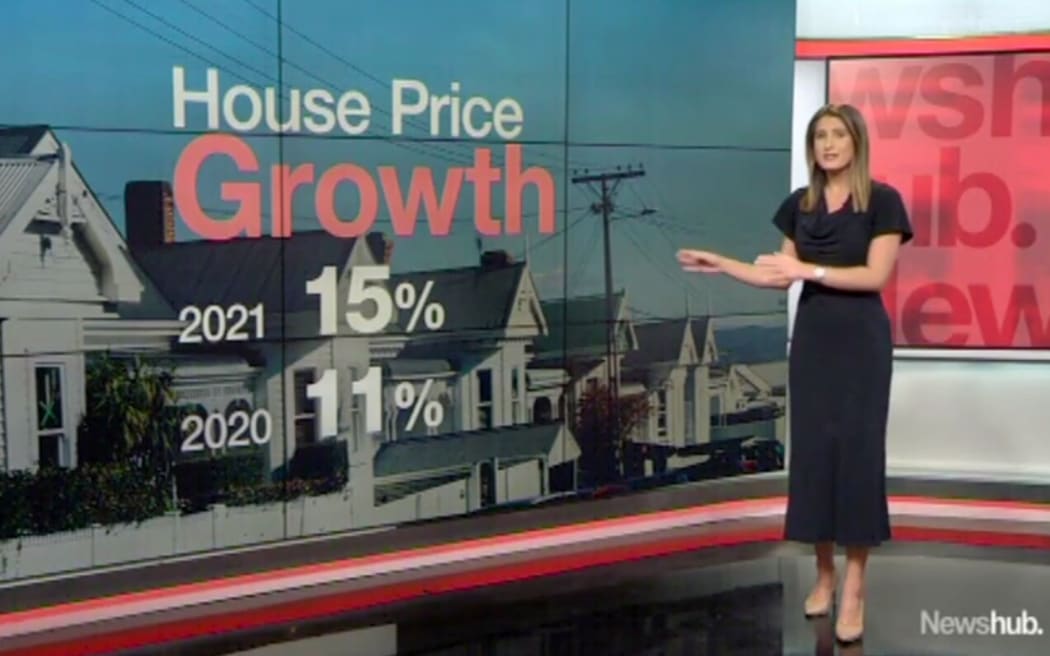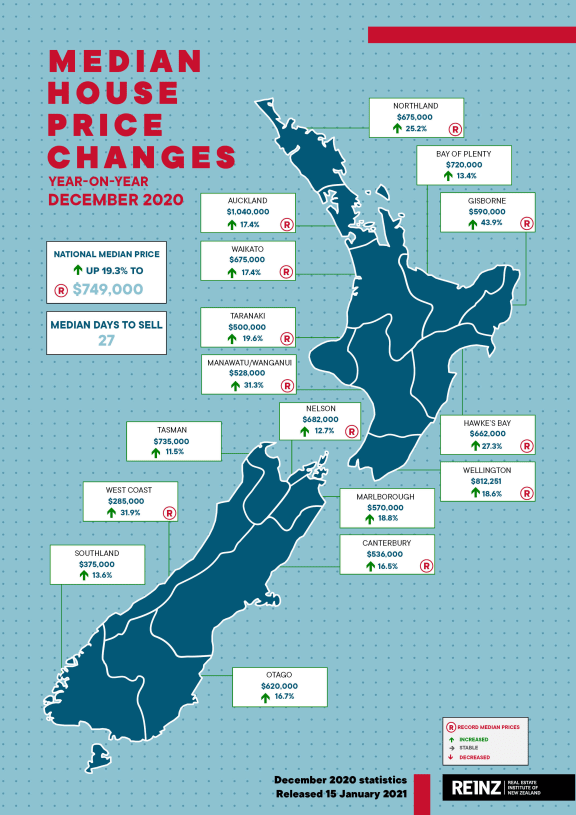Even in a spiralling housing crisis, record property price rises keep getting covered like they're good news. Can the media break its habit of speaking from the perspective of existing homeowners?

Photo: screenshot / Newshub at 6
A recent Newshub story on house prices more than doubling in the Bay of Plenty started out with a call for celebration.
“If you’re a homeowner in the Bay of Plenty, get out the champagne,” reporter Madison Reidy said.
“Asking prices in Kawerau have surged 132 percent in the past decade.”
The story went on to list other places including Central Hawke's Bay and Hamilton where house prices have gone up more than 100 percent over the last 10 years.
Those numbers will definitely prompt homeowners, and particularly property investors, to break out the bubbly.
But Newshub at 6 could equally have urged aspiring first home buyers, who have watched prices rise faster than they can save, to break out an Elliott Smith soundtrack and strong liquor.
Renters could have been advised to crack open an on-discount Ranfurly Draft to console themselves over the fact they'll soon be paying even more of their paychecks to their landlords, as home ownership stretches further out of reach.

Photo: REINZ
Newshub was not alone in centering its story’s intro on the concerns of existing homeowners.
Last year TVNZ1 News was dour over the news that rents were going down in the South Island during a surprise Covid-induced housing supply boom.
“The cost of renting has dropped in much of the South Island in the wake of Covid-19. It’s been felt most noticeably in Queenstown, where an oversupply of houses has seen landlords slash prices, and as Jared McCulloch explains, the situation could get worse,” presenter Melissa Stokes said.
If reductions to our stratospheric rent prices is an example of a situation "getting worse", then the one in three New Zealanders living in rental accommodation will be praying for more bad news. 1News was obviously speaking from the perspective of their landlords.
Other stories seem to assume their audience is about to buy up a property portfolio.
Stuff began an article on Gisborne’s house prices going up 31 percent in one year with some words of advice.
“If you want big capital gains, Gisborne is the place to be right now,” it read.
“When Auckland’s median house price hit the $1 million mark recently, it grabbed the headlines. So too do the regular reports of escalating prices in the big cities. But Gisborne, the first city to see the sun in the world, is currently home to one of the hottest markets in the country.”
On Monday TVNZ 1News ran a story on an increase in the number of homeowners choosing to sell privately, which seemed to assume that viewers would be weighing up getting in on the action.
“Selling or buying privately could mean more money in your back pocket, but it’s not as easy as you might think,” presenter Melissa Stokes said.
The news of those potential savings, and of the capital gains on offer in Gisborne, wouldn't be that exciting for the many viewers and readers who don’t own a house, and possibly never will.
It’s not always just who news organisations address their stories to - it’s also the stories they choose to tell.
Last Sunday Newshub honed in on a tranche of new housing being built in the west Auckland suburb of Te Atatū.
Instead of extolling the benefits of townhouses and apartments close to the city, it focused on existing homeowners’ concerns over the fact that more people will be living near their chicken coop and swingball set-studded backyards.
“We’ve got five [houses] being built here right on our backyard. You used to be able to see the water and the horses over on the peninsula and you can’t see any of that now. Straight over the road, another nine being built,” said Te Atatū resident Siobhrin Burmester.
“Yes, definitely feeling invaded,” she told Newshub.
While it’s sad one woman will no longer be able to gaze at horse-filled fields in a suburb 15 minutes away from Auckland’s city centre, that problem is arguably dwarfed by the benefits of building hundreds of new homes during a housing emergency.
Newshub’s story didn’t spend any time covering those who may get a foothold in the property market, or find an affordable place to rent, thanks to Te Atatū’s new developments.
Maybe that lack of attention to the concerns of non-homeowners is partly down to the fact a majority of New Zealanders still live in owner-occupied houses.
But another factor could be at play.
During the Black Lives Matter protests in the US last year, when newsrooms were asked to confront their records on race, the reporter Wesley Lowery wrote an op-ed for the New York Times where he accused media organisations of defaulting to a vision of a white, affluent person when they imagine their audience.
“Conversations about objectivity, rather than happening in a virtuous vacuum, habitually focus on predicting whether a given sentence, opening paragraph or entire article will appear objective to a theoretical reader, who is invariably assumed to be white,” he wrote.
Lowery was writing on race, but his broader accusation was that media organisations - whether consciously or not - tend to default the voices of the privileged.
That’s not universal. In New Zealand, reporters - including those on Newshub, Stuff, and TVNZ - have by-and-large done a decent job of covering the victims of the housing crisis as well.
In a recent feature for The Spinoff, Alex Braae looked at the downside of that bubbly-busting house price surge in Kawerau reported earlier by Newshub.
He found residents living in substandard, overcrowded accommodation struggling to pay for double-digit rent rises. Home ownership wasn’t even on the horizon for them.
Newshub's Madison Reidy followed up her 19 January report with another focused squarely on the concerns of first home buyers.
“If you're a first home buyer trying to break into the country's overheated market, you might be out of luck this year,” her article began, accurately.
But it’s telling that when media organisations address their audience directly, they often gravitate to the perspective of property owners.
In every intro excited about record house price rises, thousands of families are hearing that home ownership is out of reach or that they're facing the prospect of ever-rising rents.
Newsmakers could keep those people in mind when they're writing their scripts. They could ask more often before going to air: whose voice is being amplified here? And whose voice is going unheard?


